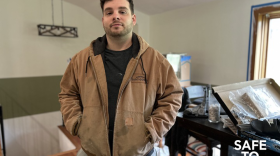French manufacturing company Saint-Gobain’s Merrimack facility, which has been at the center of years of regulatory and community backlash over air and water pollution tied to its emissions, is poised to be approved for state permits to operate, which would be in effect for five years.
The state Department of Environmental Services held a hearing Wednesday for these draft permits. Of the nine people who commented at the hearing, all requested that the department deny the permit applications.
Saint-Gobain has faced intense scrutiny from regulators and the public after the Merrimack facility was found to have contaminated hundreds of drinking water wells through its use of Per- and polyfluoroalkyl substances (or PFAS) chemicals which are emitted in the air. The company still uses these in operations.
The facility is located less than a quarter mile from the Merrimack River, and is surrounded by shops, homes and schools. Local residents have repeatedly called for plant operations to shut down entirely since the pollution was discovered. PFAS chemical exposure is linked to health problems such as cancer and immune system effects, which environmental advocates argue could explain the higher-than-normal cancer rates in Merrimack and the surrounding area.
What are the permits for?
At this week’s hearing, Catherine Beahm, who works as an administrator with the Air Division in the Department of Environmental Services, said the company currently meets all requirements for the temporary permit that was issued in June of last year and that safeguards are in place to minimize the risk of PFAS contamination. The hearing also reviewed an application to amend the temporary permit for their facility's bypass stack, which redirects emissions into the air when turned on.
The permit drafted by the department requires that the regenerative thermal oxidizer (or RTO), which was installed in 2021, must be on at all times to capture and burn PFAS emissions before they can enter the environment. The RTO must also be kept at a minimum temperature of 1,832 degrees Fahrenheit, which is required to ensure the PFAS chemicals burn, according to Beahm.
Another requirement in the permit is that the bypass stack can only be used for up to 175 hours a year. Beahm said the bypass stack should only be turned on if the RTO malfunctions.
The department will also require annual PFAS stack testing to ensure emissions are below stated limits.
Michael Fitzgerald, assistant director of the Department of Environmental Services, said comments made during this hearing may affect the permit’s content, as well as approval by the director.
Pushback at public hearing
Roughly 20 people came to Wednesday's hearing. Among them was Merrimack resident Wolfram Van Schoen, who asked if the state environmental agency will be doing anything to ensure the data from stack testing provided by Saint-Gobain is accurate. State regulators used this data in calculations that helped establish the limits on the four state-regulated PFAS chemicals, as well as projected impacts on groundwater.
“Anybody that deals with industrial controls knows that they're not really that hard to work around,” said Van Schoen.
Multiple residents raised concerns over how PFAS from Saint-Gobain, even if it was within the limits from their permit, could affect their water.
New Hampshire has had limits on PFAS in drinking water since 2020, but new federal regulations that would limit those chemicals even further are expected to be finalized this year. The EPA has said there is virtually no safe level of two PFAS chemicals – PFOA and PFOS – in water.
Merrimack resident and environmental advocate Laurene Allen said the air emission monitoring plan included in the application is inadequate, and that the department can enforce stricter regulations whenever they want to.
“Saint-Gobain will say they're following the law. They've said that to some of us face to face. It's an arrogant and appalling statement to make to impacted communities,” said Allen.
Nicole Janosz said surrounding communities like Manchester, where she lives, are also subject to PFAS exposure from the facility.
She approached the stand with photos of her husband and three sons. Janosz said her husband and 11-year-old son were both diagnosed with kidney cancer and are in remission. But as long as Saint-Gobain continues to operate, she said, her family's health is no guarantee.
“I pray to God that my son grows to be old and gray. And I pray that my husband gets to see his boys turn into men. Please deny this permit, please,” said Janosz.
Representatives from Saint-Gobain did not attend the hearing in person, according to a spokesperson.
Over email, a company spokesperson said Saint-Gobain is “confident in their ability to operate within permit parameters.”
“We trust the [Department of Environmental Services] will fairly and thoroughly consider the draft air permit and the comments made during [this week’s] hearing,” the statement reads.
The public comment period will run until 4:00 P.M. on July 5.The state will make their decision by August 11.








